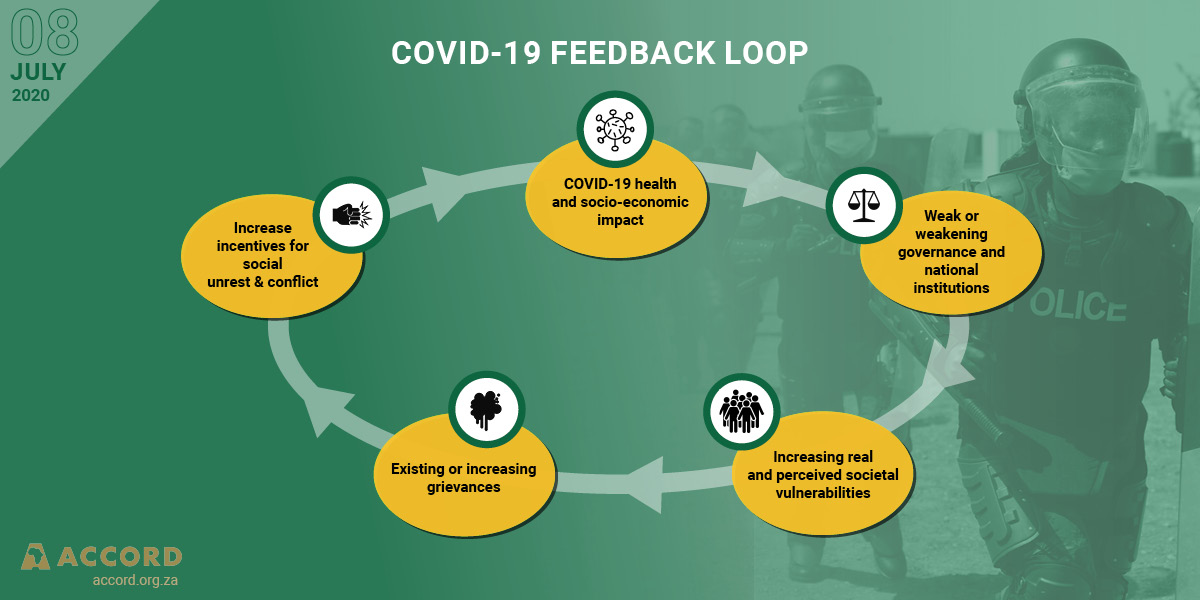In the four months since the COVID-19 pandemic was declared by the World Health Organization (WHO), the stress caused by the virus is revealing the strengths and weaknesses of various governance systems. A fundamental challenge was identified in one of the first issues of the COVID-19 Conflict & Resilience Monitor by Ambassador Said Djinnet, who pointed out that already in 2017, UN Secretary-General António Guterres identified that governance problems stem from a systemic lack of trust. Public trust is now under considerable stress in most countries in Africa – and the rest of the world – as anxiety and scepticism of the capacities of governments and institutions (both domestic and international) to cope with the COVID-19 increase.
Public trust in governance and institutions has emerged as an important element that determines a society’s resilience and helps to explain why some countries are coping better with the #COVID19 pandemic than others.
Tweet
In its April 2020 framework for coping with COVID-19, the United Nations warned that the pandemic “…is far more than a health crisis: it is affecting societies and economies at their core”. In other words, the capacity of national health systems to cope with COVID-19 is only one aspect among many that determines a country’s resilience to the pandemic. COVID-19 will reveal pre-existing structural weaknesses and test the resilience of the whole of society, including its environmental, social and governance dimensions. When analysing and forecasting the pandemic’s trajectory and socio-economic impact, it is useful to consider the reinforcing feedback loops at play. On the one hand, the spread of the virus and the measures to contain it exacerbate the political, economic, environmental, governance and social vulnerabilities in communities. On the other hand, increasing vulnerability and decreasing resilience, in turn, create the conditions that allow the disease to spread. These kinds of reinforcing feedback loop dynamics are likely to become more pronounced as global poverty and inequality increase in the wake of COVID-19.
The feedback loop phenomena can help explain the emergence and contagion of the Arab Spring in 2010 and the more recent Black Lives Matter movement, following the murder of George Floyd. Public anger about his murder ignited long-standing frustration with racial inequalities in the United States and across the world. The Black Lives Matter protest was partly fuelled by anxiety and tensions caused by the COVID-19 pandemic and its economic impact, which have left millions unemployed and increasingly vulnerable. In dynamics typical of the reinforcing feedback loop phenomena, the protest is likely to have acted as a vector that spread the disease further – which, in turn, will deepen the tensions and frustrations that have contributed to the protests.
Similarly, in Africa, we see an increase in COVID-19-related protests and social unrest. For example, in Tunisia – whose civil revolution is frequently hailed as the “democratic exception” because it is the only country where the Arab Spring resulted in a democratic transition – the slow economic recovery has led to discontent among Tunisians, who blame the government for the lack of economic growth and the high unemployment rate. The economic fallout from the coronavirus outbreak has further exacerbated the economic crisis, leading to a revival of public protests across Tunisia – which could lead to similar spikes in COVID-19 cases and the continuation of the feedback loop.
Public trust in governance and institutions has emerged as an important element that determines the resilience of a society to cope with the COVID-19 pandemic. This helps to explain why some governments have been able to maintain onerous lockdowns effectively and why others with relatively strong economies and health systems are struggling to contain the spread of the virus.
The measures required to slow the pandemic (such as social distancing) weaken the social capital that builds social cohesion, which is an important source of resilience during times of adversity. Therefore, policies and initiatives to contain the virus in Africa and elsewhere need to identify ways of avoiding actions that can lead to discrimination and stigmatisation over access to resources, livelihoods and health services while harnessing, maintaining and strengthening public trust and social cohesion.

